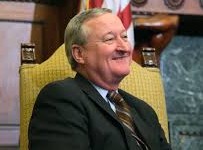Okay, we know there’s not a real mayor’s race going on. We know that the consultants are telling Jim Kenney that he ought not to appear as though he is awaiting coronation, even though, in a city with a 7 to 1 Democratic registration advantage, it’s a foregone conclusion that he’ll be our next mayor. We know they’re telling him that there’s no political advantage to making bold policy pronouncements now. Better to be a blank slate and let the voters impress their meanings onto you.

But even so, it’s still stunning just how vacuous this campaign is. For a city facing big challenges, this is the Seinfeld election: A campaign about nothing. Case in point came last week, when Kenney received the Pierce College Thomas May Pierce Leadership Award and made what passes for two substantive policy proposals.
The event was attended by more than 100 people from business, higher education and local government, and Kenney didn’t really risk any political capital when he told them “we have to have a workforce that is trained and making a living wage in the 21st Century.” Way to take on the anti-living wage lobby. But then, to his credit, Kenney forcefully laid out the problem. “The thing that bothers me most about Philadelphia at the moment is we have a 26 percent poverty rate,” he said. “It’s embarrassing.”
That’s good–we haven’t felt a lot of urgency about tackling our town’s “tale of two cities” narrative of late. Maybe Kenney’s embarrassment would fuel some bold experimentation in terms of spurring job growth? But then he got to the meat of his proposals. First, he wants to increase the number of summer internships offered by businesses and nonprofits from 10,000 to 16,000. Okay—kind of small ball, and certainly long term, and definitely difficult to ultimately measure—but, yes, more internships: Good.
But the second proposal was a head scratcher. Saying that “we really need to look at what we are doing, how we are doing it,” Kenney identified job training as the key to economic growth. If elected, Kenney promised to create a task force to identify the skills, certifications, and training sought by Philadelphia businesses. The task force report would then go to institutions like Pierce College and Community College of Philadelphia so they can align their academic programs to the report’s findings.
A task force? Haven’t the ways to create jobs already been studied to death? And, if our nation-leading poverty rate is such an embarrassment, why wait until you’re elected to convene a task force to unearth these magic solutions?
The media in attendance credulously reported the task force idea. But over the last couple of days, I’ve spoken to a handful of businessmen who all had the same eye-rolling reaction. They’d seen this movie before. The reaction was mostly incredulity: Seriously? A task force? More study? Haven’t the ways to create jobs already been studied to death? And, if our nation-leading poverty rate is such an embarrassment, why wait until you’re elected to convene a task force to unearth these magic solutions? Why not start now? Or, better yet, why not have already figured out how to rejuvenate the local economy before even running for mayor? Once upon a time, politicians actually knew what they stood for before asking for our vote.
![]() No, with this latest task force idea, Kenney was practicing the political art of appearing to get something done. It’s in keeping with an epidemic. Task forces have become the politician’s crack cocaine, and Kenney apparently needed a fix. In the last few months, the governors of Indiana, Michigan, and Rhode Island have all appointed task forces to study and make recommendations to combat the rise of drug addiction in their respective states. Last February, here in Philly, the Health Department and Councilman Mark Squilla were instrumental in convening the city’s first-ever bed bug task force. In Pittsburgh, there’s a nuisance bar task force. And in New York, Mayor Bill DeBlasio just announced a task force to study and make recommendations on how to handle the body-painted naked torsos of street performers in Times Square.
No, with this latest task force idea, Kenney was practicing the political art of appearing to get something done. It’s in keeping with an epidemic. Task forces have become the politician’s crack cocaine, and Kenney apparently needed a fix. In the last few months, the governors of Indiana, Michigan, and Rhode Island have all appointed task forces to study and make recommendations to combat the rise of drug addiction in their respective states. Last February, here in Philly, the Health Department and Councilman Mark Squilla were instrumental in convening the city’s first-ever bed bug task force. In Pittsburgh, there’s a nuisance bar task force. And in New York, Mayor Bill DeBlasio just announced a task force to study and make recommendations on how to handle the body-painted naked torsos of street performers in Times Square.
Think of what task force mania allows the elected official to do. He can appear decisive, when—like a prosecutor who relies on a grand jury to bring charges—he’s actually passing the buck. Rather than taking action, he’s actually delaying…which could result in the pressure of public opinion or media scrutiny to blow over. Case in point: In 2003 and again in 2009, we had two prominent groups—2003’s Tax Reform Commission and 2009’s Mayoral Task Force On Tax Policy and Economic Competitiveness—make virtually the same recommendations when charged with fixing our antiquated tax system. The pols—including Kenney—got credit for convening these bodies, and they paid lip service to the recommendations. And then…nothing happened. The moment for reform had oh so conveniently passed.
Now, I’m not saying that all task forces are wastes of time. Last March, President Obama appointed our own Charles Ramsey to head the Task Force on 21st Century Policing, and that group’s 80 pages of recommendations helped bring into the mainstream the idea of equipping officers with body cameras. But, more often than not, the appointing of task forces seems to have become a convenient replacement for actual governing.
You know who knows this? Jim Kenney. Reading between the platitudes, there are actually some ideas in his economic plan worthy of public debate. Sadly, in this non-election election, we don’t have a chance to do that. Instead, we have the findings of a task force to look forward to.



